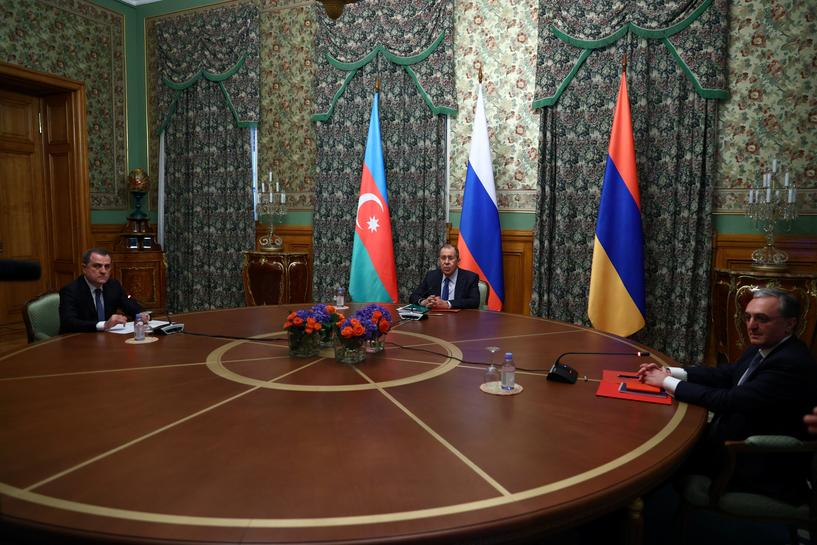
The latest conflict in Nagorno-Karabakh has been a disaster for Iran. The terms of the cease-fire agreed on by Armenia and Azerbaijan represent a grave threat to Tehran’s long-term strategic interests.
The effects of this are likely to affect the perception of the regime among the Iranian people, and alter its policies on Azerbaijan and Syria.
Azerbaijan now has control over the entirety of its border with Iran along the Aras river. While this is cause for celebration in Baku, it is viewed with alarm in Tehran because an extension of Azerbaijan’s border gives Israel access to more territory from which it can keep tabs on Iran.
Despite denials from Baku, it is no secret that Israel and Azerbaijan enjoy substantive cooperation in intelligence, energy and military matters.
Azerbaijan is one of the largest buyers of Israeli weaponry. Its use of Israeli “kamikaze” drones during the war played an important role in tilting the battlefield to its advantage — although Turkish-made Bayraktar TB2 drones have been credited as the true game-changer in the conflict.
In addition, Azerbaijan and Israel maintain deep intelligence ties. Were Tel Aviv to launch airstrikes against Iranian nuclear installations, Azerbaijan would likely play a vital role, either as a refueling stop or launchpad.
The other consequence of the war is the proposed creation of a transit corridor through Armenian territory, connecting Azerbaijan to its Nakhchivan exclave. It is likely that this corridor, which will be patrolled by Russian troops, will run parallel to Armenia’s border with Iran. This has already raised concerns in Tehran, as it could effectively cut off Iranian access to Armenia, and from there to Europe via Georgia. For a country already reeling from international sanctions, it is of great importance to Iran that it maintains access to friendly neighbors.
Such is the panic that has set in, Iran’s Deputy Foreign Minister Abbas Araghchi was compelled to explicitly issue an assurance that access to Armenia will not be threatened. It is noteworthy that Iranian Foreign Minister Javad Zarif will soon travel to Moscow and Baku to discuss the issue in more detail.
However, it is even more important to take note of a capital city he will not be visiting: Ankara. Turkey is another important winner in the conflict. Not only will its troops maintain a presence in Azerbaijan, it also will have direct access to the Caspian Sea through the proposed Nakhchivan-Azerbaijan corridor. Ankara can now directly project influence in Central Asia, which has been one of President Recep Tayyip Erdogan’s most cherished ambitions.
Tehran will have taken note of Russia’s reluctance to offer full-throated support to its ally, Armenia. The takeaway from Moscow’s role in the Nagorno-Karabakh conflict is that it is happy to sacrifice an ally if it becomes too bothersome. Nikol Pashinyan, Armenia’s prime minister, came to power through the sort of “color revolution” detested by Russian President Vladimir Putin. Pashinyan further annoyed him by jailing Robert Kocharyan, Armenia’s former president and erstwhile Putin ally.
In this conflict, then, Moscow stuck to the letter, rather than the spirit, of its alliance with Yerevan, stating that its security commitments only extend to Armenian territory. The Russians allowed Azerbaijan to reclaim all its lost territories, while Armenia retained rump areas around Nagorno-Karabakh’s capital.
Moscow will maintain its influence in the region by providing a peacekeeping force in Karabakh and along the proposed Nakhchivan-Azerbaijan corridor. It also will be happy to see the back of Pashinyan, whose political career seems to be over. Russia also appears to be guided by its broader goal of ensuring that Turkey remains out of the orbit of the West.
Astute policymakers in Tehran will likely draw the right conclusions from this, particularly in terms of what it might augur for Iran’s ally in Syria, Bashar Assad. Having seen the eagerness with which Russia and Turkey were willing to hash out a deal between themselves, Tehran is likely to push the Assad regime in the direction of concluding the Syrian civil war.
The main effect the outcome of the conflict will have on domestic politics within Iran is likely to be psychological. It is yet another blow to Tehran’s self-image as a regional hegemon.
Dnyanesh KamatThe main effect the outcome of the conflict will have on domestic politics within Iran is likely to be psychological. It is yet another blow to Tehran’s self-image as a regional hegemon. Indeed the fact that the regime was a bystander to the conflict, unable to influence its outcome, will revive memories of the two Russo-Persian Wars of the 19th century, which resulted in Persia having to cede control over the entire South Caucasus.
It reveals to the Iranian people that Tehran no longer has the economic might, the technological sophistication or an alluring political model to influence a region that was under Persian influence for hundreds of years — one is tempted to say thousands, since the time of the Achaemenid empire.
Taken together, all of this represents yet another slight to the legitimacy of the regime that has ruled Iran since 1979.
 Eurasia Press & News
Eurasia Press & News



